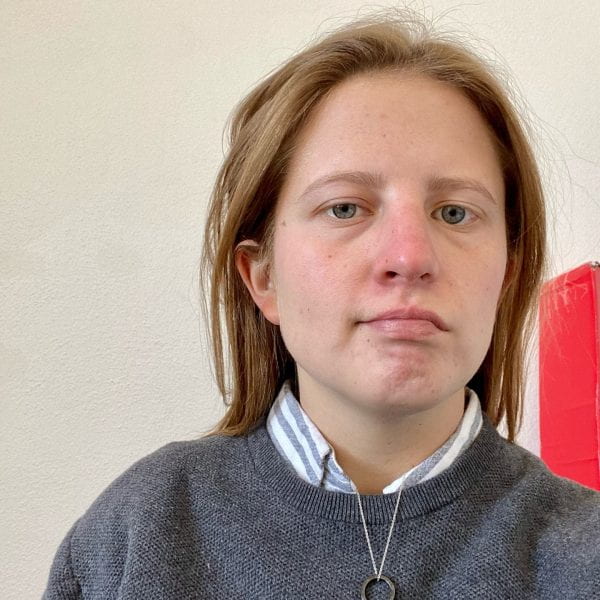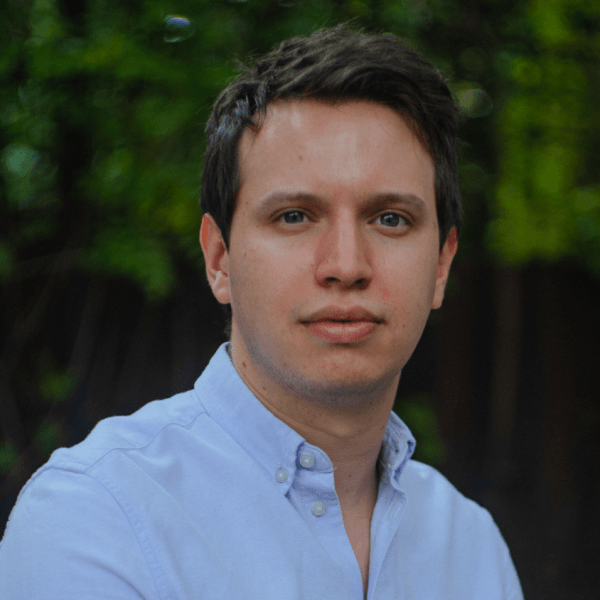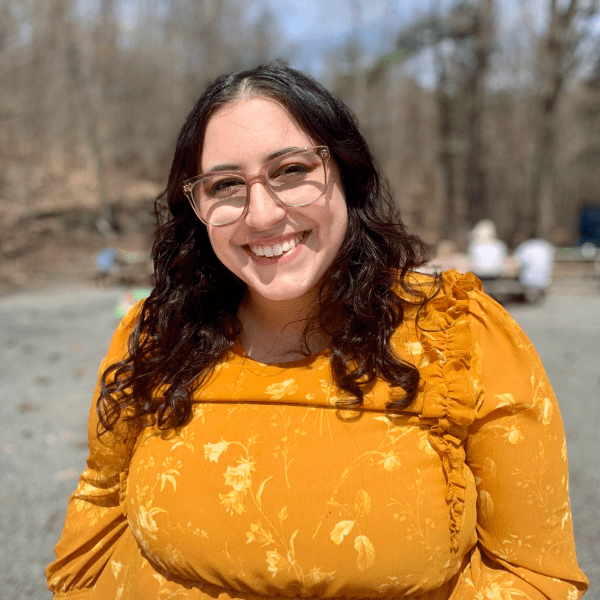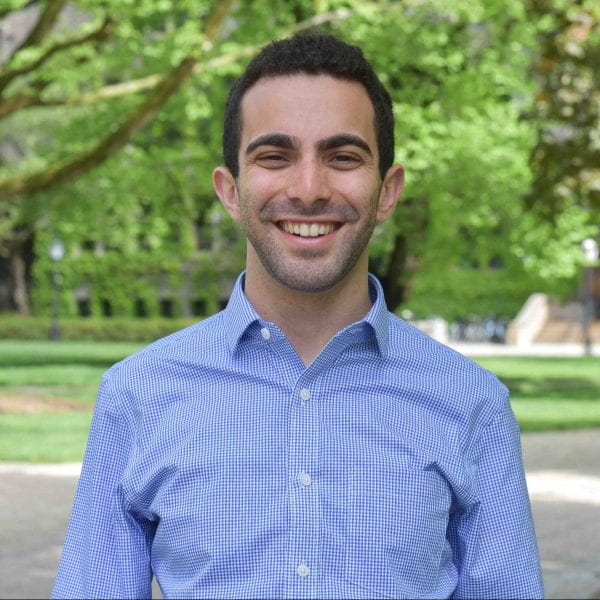Meet the 2023-2024 class of the Kreisman Graduate Fellows Program, a cohort of University of Chicago graduate students from across fields of study who are committed to pursuing careers in housing research or practice. During the academic year, Kreisman Graduate Fellows take part in a range of professional development activities, including meeting leaders in the housing field, professional development sessions, and an independent internship or research project in the housing field, supported by a stipend. Learn more below about their backgrounds, and their independent project, and read their writing on the Kreisman blog.
Hannah Bernick
MPP, Harris School of Public Policy
Bio
Hannah Bernick is a Master’s in Public Policy candidate at the Harris School of Public Policy. She has a deep passion for urban policy and is focused on making an impact in housing policy in cities after graduation. She is pursuing certificates in municipal finance and policy analysis. In addition to the Kreisman fellowship this year, she serves on the board of the Urban Policy Student Association, and as a producer of the Public Money Podcast. Before starting at Harris, she graduated from the University of Colorado Boulder with majors in economics and gender studies. After graduation, she interned in the Colorado Governor’s Office of State Planning and Budgeting, which kickstarted an initial interest in public money. From there, she worked in the Colorado State Legislature for two sessions where she developed a strong passion for policy and the legislative process. Just prior to moving to Chicago, she worked as an aide to a Denver city councilperson, which solidified her interest in urban policy. Specifically, she saw how a lack of affordable housing touched every single corner of the city and knew her calling was in this area. She is excited to learn from her fellow Kreisman fellows as well as the Kreisman program this year.
Hannah interned with the Alderman Daniel La Spata’s 1st Ward Office in the spring quarter of 2024. She produced research on how cities across the country are addressing an influx of migrants — specifically on their policies to house the migrants in the short and long term. The ward office will be able to use this research to learn from what other cities’ best practices and hopefully be able to use what the cities have learned to create better policies in Chicago. She also did research on the different funding streams the federal, state, county, and city governments offer to support housing Chicago’s new arrivals.
Francesca Chicoine
MPP, Harris School of Public Policy
Bio
Francesca Chicoine is a public policy graduate student focused on housing, public health, and criminal justice policy reform. Prior to her time at the University of Chicago, she worked in the non-profit sector dedicated to improving systems and advocating for equitable policies. Her first notable role in the housing field was a policy internship at Destination: Home, where she analyzed state and local housing policy and advanced Santa Clara County’s Community Plan to End Homelessness. Additionally, she worked for the National Center for Youth Justice on their Juvenile Justice policy team advocating for California’s state legislature to decriminalize youth. After graduating with her bachelor of arts from the University of Portland, she joined Abode Services, where she facilitated housing placements for individuals experiencing homelessness while providing critical housing resources. Francesca’s experiences underscored the intersection between the housing crisis and drug criminalization, leading her to delve into the public health aspect of these challenges. In her current role, at the Public Health Institute’s Bridge Program, she supports hospitals in reaching accessible, evidence-based, and equitable 24/7 emergency care, specifically focusing on harm reduction for addiction treatment, reproductive health, and public health screening.
Francesca’s research project focuses on the effectiveness of Permanent Supportive Housing as a solution to homelessness and the barriers to its implementation and sustainability. Her project examines Permanent Supportive Housing as a promising solution by providing stable housing coupled with supportive services, thereby addressing both housing and health needs. Utilizing data from the U.S. Department of Housing and Urban Development’s Family Options Study and other qualitative reports, Francesca evaluates the cost-effectiveness of Permanent Supportive Housing and its capacity to provide long-term stability for individuals experiencing chronic homelessness. The research highlights that Permanent Supportive Housing significantly reduces homelessness and is cost-effective. The cost to support an individual in permanent supportive housing is approximately $1,162 per month, which is 60% less than the cost of emergency and social services provided to an unhoused individual, reported at $2,916 per month. Learn more about Addressing Homelessness through Permanent Supportive Housing.
Mercedes Garcia
MPP, Harris School of Public Policy
Bio
Mercedes Garcia is a public policy graduate student focused on the intersection of health policy and well-being outcomes for indigenous peoples, women, and youth when considering child welfare, juvenile justice, and homelessness laws and policies across all levels of government. She is a citizen of the Pascua Yaqui tribe and was raised by community and grassroots organizing, which continue to ground and drive her work and advocacy efforts today. She earned her Juris Doctorate (J.D.) and Master of Laws (LL.M.) in Indigenous Peoples Law & Policy from the James E. Rogers College of Law at the University of Arizona in 2011 and 2012, respectively. Following her time as a Deputy Prosecutor in her community, Mercedes served in the Bureau of Indian Affairs within the Department of Interior, where she championed an Obama Initiative and created a holistic well-being model for indigenous populations, forming partnerships with and among 61 federally recognized American Indian & Alaska Native tribes. She formulated the Tiwahe (family) Initiative to enable tribes to self-determine the use of their federal funding to enhance the coordination of care for families among social services, tribal courts, housing, and workforce providers and enable services grounded in the languages and traditions of each community and which improved holistic well-being outcomes across all communities. She is a recent entrepreneur, formulating her own company to uplift and empower Native peoples, organizations, and partners. With these communities, she continues to lead the call for action to change laws and policies that leave Native peoples behind across every well-being aspect, from physical, social, and emotional well-being to economic mobility. Mercedes was raised by a single mother in a multi-generational household to whom she credits her own tenacity, humor, grit, and unfettering belief that we can do anything to which we set our minds.
Mercedes collaborated with the US Interagency Council on Homelessness (USICH) as a strategy to enable policy and statutory reform from the federal level to the state and municipal levels. The integration of the goals of the USICH’s All In: The Federal Strategic Plan to Prevent and End Homelessness, which is the most recent report produced by the agency and only the second time it included consultation from Alaska Native and American Indian communities, provided a familiar baseline for community-based organizations and other stakeholders to drive change. As an ancillary, she worked to develop a multi-disciplinary, multi-jurisdictional community-building template that 1) maps unhoused population resources and services across an area, 2) provides a foundational guide for partnership among a network of community-based service, health providers, and grassroots community organizers, which, ultimately, results in the improvement of health and well-being outcomes of unhoused women, unhoused former foster youth, and indigenous peoples.
Daniel Grinspan
MPP, Harris School of Public Policy
Bio
Daniel Grinspan is a graduate student focused on urban policy, with an interest in public-private partnerships, affordable housing, urban design, and economic development. Before starting his master of public policy, Daniel graduated with a bachelor’s in urban planning and development from Ball State University and worked at a private firm practicing urban design. His experiences growing up in various international cities such as Reykjavik, Iceland, and Tegucigalpa, Honduras, have given him an interest in how different cities develop and how they can continue to be developed to provide housing for all income levels.
Daniel researched and created a poster proposing a car-free neighborhood in currently vacant space near Bartlett, Illinois. The community would be designed to make it easy for residents to walk or access public transit, while taking away the need to drive because of the lack of roads. Daniel took inspiration from the community of Culdesac in Tempe, Arizona, which was designed by Opticos Design, Inc.
Toyan “TJ” Harper
PhD, Crown Family School of Social Work, Policy, and Practice
Bio
TJ Harper is a doctoral student at the University of Chicago Crown Family School of Social Work, Policy, and Practice, where he also earned a master’s degree in social policy in 2021. His research explores the reentry process, specifically focused on familial involvement and how formerly incarcerated people access housing post-prison and engage with health recommendations. He seeks to understand the experiences formerly incarcerated people encounter when they seek treatment in their communities. TJ’s research particularly focuses on reducing system inefficiencies — between prisons and other institutions such as hospitals — that interrupt the continuum of care formerly incarcerated people receive. Using a mixed-methods approach, TJ seeks to inform policy decisions and facilitate a smoother integration of care received in prisons and within communities post-release. Prior to graduate school, TJ worked at various nonprofit agencies and government entities which broadened his perspective to the possibilities of public service. He aspires to working toward a more just and humane society that prioritizes health equity for people and communities that have historically experienced marginalization and exclusion.
Toyan “TJ” Harper participated in an internship program at Heartland Alliance, where he worked with individuals who were struggling with homelessness, substance use issues, and mental illness. Throughout this time, TJ was involved in working in several permanent supportive housing programs where individuals received medication monitoring, harm reduction, motivation interviewing, and other wraparound support services. During his time, TJ was able to work with program participants by providing group therapy sessions through the lens of art therapy sessions and future envisioning sessions. Throughout this venture, TJ became particularly interested in the formerly incarcerated population and especially those who are exiting prison and do not immediately have a place to stay. Once the internship concluded, TJ took some time to build a qualitative narrative approach to better understand the social support structures that formerly incarcerated people have. To accomplish this, TJ spent some time conducting semi structured interviews to better gain insight into these experiences. TJ had the opportunity to interview five participants, all of whom reside in the city of Chicago at a local shelter. Throughout these interactions, TJ was able to glean that by prisons and jails not providing appropriate planning services, individuals from lower-income backgrounds face significant hurdles when attempting to reenter. Participants overall expressed feelings of loneliness, internal conflict, self-doubt, and a feeling of hopelessness. While this project originally focused primarily on the individual perspective, TJ is now hoping to expand this project to an ethnographic study that will further include observations of shelters, jails, and prisons; semi structured interviews with shelter workers and administrators; and document analyses of various projects. Given that 640,000 people return home from incarceration each year – and the collateral consequences of family members and loved ones—this future research has wide-reaching housing implications that necessitate a government imperative.
Arturo Sanchez Navarro
MPP, Harris School of Public Policy
Bio
Arturo Sanchez Navarro is an urban planner and public policy graduate student dedicated to exploring the impact of public spaces, housing, and transportation on dense conurbations, based on principles of legible, intuitive, and innovative design. Arturo graduated cum laude from Universidad Nacional Autónoma de México with experience at Politecnico di Torino. His studies at the University of Chicago, with the support of a Fulbright scholarship, focus on how programs and regulations are complementary to public infrastructure, through data driven decision-making processes and statistical tools. Arturo has recently worked as a Mayoral Fellow with the City of Chicago, as a graduate intern with the Chicago Transit Authority (CTA), and as a research assistant in the Cities in Protest course. Prior to that, he participated with the Ministry of Mobility of Mexico City as Head of the Infrastructure Studies Department, leading urban design, signage, iconography, and road safety strategies. Additionally, Arturo is passionate about languages, music, and graphic arts, developing independent editorial design, illustration works, and cartographic projects.
Following his one-year tenure as Academic Fellow at Mayor Brandon Jonson’s Office, where he co-authored a policy proposal for the Department of Housing inspired by Vancouver’s Empty Homes Tax, Arturo further developed this promising notion as a Kreisman fellow though an extensive Literature Review project. This work examined thirteen academic papers focused on the Canadian initiative, destined to alleviate the pressing needs for affordable housing while contributing to the city’s revenue, seeking to identify commonalities and insightful teachings through the wide range of analytical methods employed. In complement, Vancouver’s own Empty Homes Tax Annual Reports (2018-2023) provided valuable information regarding the historical performance of the program, serving as a point of comparison to integrally assess its effectiveness. The results of the review suggested positive impacts of the policy on housing supply and affordability, encompassing broader positive societal effects, such as reductions in crime rates and a partial demand coverage for student housing. Nonetheless, the evaluation identified some unintended consequences, pointing towards the need for a careful refinement of such relatively recent interventions. Lastly, Arturo conducted additional engagement activities with the Mansueto Institute, collaborating with post-doctoral fellows to explore the urban decay phenomenon through Computer Vision technology.
Danya Sherbini
MPP, Harris School of Public Policy
Bio
Danya Sherbini is a second-year public policy graduate student focused on the intersection of data science, technology, and urban policy. During her first year at The Harris School, Danya interned with the Federal Reserve Bank of Minneapolis, where she analyzed mortgage and commercial real estate loan loss rates as part of the Fed’s annual quantitative capital stress testing. Prior to graduate school, Danya worked in the advertising technology sector, advocating for stronger focus on privacy-centric solutions for advertisers. Her earlier career experience includes growing a mentorship program to help close the gender and diversity gap in technology and developing tech-oriented tools for smallholder farmers in Kenya. A long-time proponent of digital equity, she has campaigned for expanded broadband internet access in New York City and has worked with the U.S. Department of Commerce to synthesize national internet use data. She enjoys writing about public policy and has had her work published in Tech Policy Press and Chicago Policy Review, where she also serves as an executive editor. She holds a Bachelor of Arts from Northwestern University. In her free time, she enjoys swimming, playing volleyball, and walking her dog around Hyde Park.
Danya completed an internship with TechEquity Collaborative on the Housing Data Initiative. For her internship, Danya combined her skills and interest in data science with her passion for housing policy. Danya worked with Tech Equity Collaborative, a non-profit organization focused on mitigating the negative societal impacts of technology and the tech sector. Within the organization’s work, Danya contributed to the Housing Data Initiative, an effort to create and maintain a database of comprehensive nationwide rental data, sourced from government and private entities. Danya helped clean, manipulate, and analyze data in order to support TechEquity’s ongoing advocacy and research efforts related to improving access to fair and affordable housing. She also contributed to ongoing work to use the organization’s growing rental database to map compliance of California rent control policies and build tenant-facing tools to help prospective renters find information about rent history, average rent by neighborhood, and other data to aid in their search for affordable housing.
Elias van Emmerick
JD, The Law School
Bio
Elias van Emmerick is a second-year law student at the University of Chicago, focused on environmental law, sustainable urban development, and fair housing. Before starting law school, Elias received Bachelor’s of Arts degrees in Economics and Politics from Pomona College, and worked as a predoctoral research assistant at the University of Chicago Booth School of Business. In law school, he is president of the National Lawyer’s Guild chapter and works as a research assistant on energy policy. Hailing from Belgium, Elias is particularly aware of the importance of public housing, and is interested in shifting discourse from market-based vouchers to government-provided housing. In his free time, Elias can be found bouldering, hiking, or attempting to ensure his many plants survive the Chicago winter (they rarely do).
Elias worked on a research paper under the supervision of University of Chicago Law School Professor Lisa Bernstein addressing the United States’ dual crisis of a severe housing affordability shortage and the escalating impacts of climate change. The paper finds that these two issues are linked by a common factor: the prevalence of single-family zoning, which limits the development of higher-density housing options, driving up housing prices and exacerbating urban sprawl. This in turn increases reliance on cars and perpetuates carbon-intensive transportation patterns. The paper proposes strategies to incentivize zoning reform by linking federal climate-related aid programs to states’ adoption of zoning policies that promote density and sustainability, focuing specifically on California and Florida as targets for this strategy.
Max Wagner
MPP, Harris School of Public Policy
Bio
Max Wagner is a public policy graduate student interested in climate resilience, transportation, and housing. At Harris, Max is the director of advocacy for the Urban Policy Student Association and serves as a copy editor on the Chicago Policy Review. Prior to attending the University of Chicago, he spent two years working in communications and data analysis at Sunwealth, a solar investment firm that builds community-based solar projects. Max graduated from Northeastern University and completed co-ops at Boston Consulting Group, Massachusetts Clean Energy Center, and Sunwealth. In his free time, he enjoys running, biking, and exploring Chicago’s unique architecture.
For his research project, Max worked with Professor Emily Talen on her project to assess the housing shortage in Chicago, analyzing where more housing is needed and where there is available zoning capacity. Specifically, he examined a change to the local zoning code that passed Chicago City Council in 2020: the Additional Dwelling Unit (ADU) Ordinance. ADUs became legal in five zones scattered throughout the city, adding more zoned capacity to neighborhoods where previously only single-family homes were allowed. He sought to answer how effective the ADU Ordinance has been at generating affordable housing using data from May 2021 to January 2024. He compared five ADU pilot zones in different parts of the city, looking at total number of ADU permits issued, number of legally restricted affordable permits issued, and median gross rent. He found that newly permitted ADUs are not distributed evenly across the five zones, with 82.5 percent in the North and Northwest zones. Notably, permitting for ADUs was stricter in the South and Southwest zones. He also found that most of the new units are market-rate – In total, only 49 affordable units were permitted between May 2021 and January 2024, with 37 of those units located in the North and Northwest zones.
Alexander Weinberg
PhD, Kenneth C. Griffin Department of Economics
Bio
Alexander Weinberg is a PhD Student studying Economics at the University of Chicago. His research focuses on urban economics, public policy, and inequality in both historical and contemporary settings. He received his Bachelor of Arts in Economics with honors from the University of Chicago in 2019.
For his project, Alexander researched job decentralization (job sprawl) in urban areas, focusing on the 100 largest labor market areas in the United States, with particular emphasis on Chicago. Using data from Dun and Bradstreet address-level records (1969-2020) and the Illinois Registry of Corporations (1902-1984), Weinberg analyzed long-term trends in the geography of urban employment. His work revealed that all sectors of the economy experienced job decentralization from 1970-2020, driven by both the location of entering and exiting firms and the relocation of existing businesses. Weinberg’s research showed how jobs progressively moved away from traditional urban central business districts to suburban areas, altering the spatial relationship between housing and employment opportunities. Importantly, his findings highlight how the exclusion of Black households from suburban areas through discriminatory practices prevented them from accessing these new job opportunities, exacerbating racial income inequality. His research contributes to understanding how changes in the spatial distribution of jobs mediate economic shocks and affect different demographic groups, offering insights relevant to urban economic development and policy-making. “Creating equal access to housing near economic opportunity remains an important issue today. I believe we can learn from the mistakes of the past to learn how to improve policy today,” Weinberg commented.
Learn more about previous cohorts:










